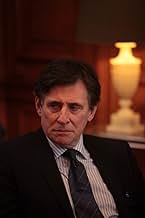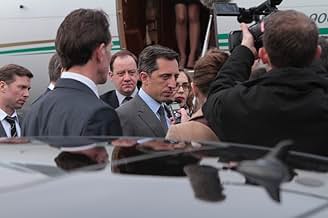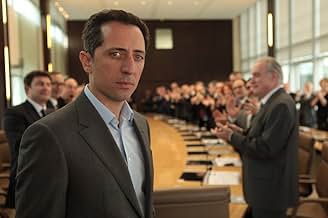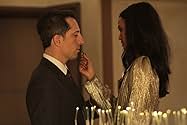VALUTAZIONE IMDb
6,5/10
5759
LA TUA VALUTAZIONE
Aggiungi una trama nella tua linguaThe newly appointed CEO of a giant European investment bank works to hold on to his power when an American hedge fund company tries to buy out his company.The newly appointed CEO of a giant European investment bank works to hold on to his power when an American hedge fund company tries to buy out his company.The newly appointed CEO of a giant European investment bank works to hold on to his power when an American hedge fund company tries to buy out his company.
- Regia
- Sceneggiatura
- Star
- Premi
- 1 vittoria e 2 candidature totali
Recensioni in evidenza
It's interesting that Costa-Gavras chose to make a personal diatribe against finance through his "Capital" since he's most renowned for his politically-oriented themes that contributed to such memorable movies as "Z" or "Missing". I say 'interesting' because "The Capital" reminded me of another finance-themed film from another political director: Oliver Stone's "Wall Street", THE movie that summed up the inner amorality of finance through the iconic : 'Greed, for a lack of better word, is good'
I wasn't surprised that the political director made his cinematic "J'accuse" against finance, since it proved to be true ruler of our liberal world, whose only alibi for existence is to pretend there's no better alternative. After the economical crisis, the Goldman Sachs and Bernard Madoff' cases, after the French President claimed to have made finance his enemy, finance was definitely political matter, and if Costa-Gavras makes a film about it, it's certainly worth our attention. The question is: what would the film show that "Wall Street" didn't? (and this comes from someone who didn't even watched its sequel, "The Wolf of Wall Street" or "Margin Call", not yet)
I expected the most overused clichés from "The Capital", the young ambitious yuppie (Gad El Maleh) riding a fast ascension, his discovery of a world of corruption, lust and greed, ethical dilemmas, probable redemption etc. And the casting of Gad El Maleh didn't comfort my thoughts. Gad (as he's generally called) is one of the most popular comedians in France, but his transition from stage to cinema didn't bring much positive results. His "Chouchou" and "Coco", both cinematic adaptations of popular sketches were critically panned, much more; Gad never really struck as a serious comedian, and was never considered an equal to Jean Dujardin or Vincent Cassel, to give you an idea.
Then I looked at the trailer and was already cringing at his crisped face, he was obviously trying to inhabit the gravity of the subject by playing the tough-guy, and if it doesn't work for Di Caprio, it's even worse for him. The trailer gave away the most archetypal situations, the corrupt bankers, the cynical American, the sexy top-model, the fast-paced editing and the obligatory round trips between Paris, New York, London and Tokyo. I really didn't expect much, and watching the film was almost accidental. The film was a commercial bomb, and even Gad's popularity didn't help, or were people tired of the subject? I guess I wanted to see where I would stand for, and my expectations were so low they could only be positively contradicted.
The first good point relies on the straight-forward narrative, Marc Tourneuil (Gad El Maleh) is not the Boy Scout that would make a perfect puppet for his hierarchy: he understands the malevolent schemes behind his nomination as a CEO of Phenix bank, replacing the former, cancerous President. He knows he has the opportunity of a lifetime to win money and be the master of his own actions. That's a first deviation from the usual 'selling-soul-to-the-devil' plot and it was quite refreshing to see a character who already embraced the cynicism of his environment. The film turns immediately into a chess game involving Tourneuil, the board members, the head of an American hedge fund (Gabriel Byrne), and in a zero-sum game, we expect only one winner.
Indeed, it doesn't take a MBA degree to understand the plot, complex but not contrived. In a nutshell, it's all about finding the tricks to distract the French government from a plan of mass-layoffs in order to increase Phenix' profitability, there are many cases of insider trading, of political maneuvers, fiscal exits and such expectable lines as 'money never sleeps'. The film tries to cover every aspect of finance, succeeding by not making it feel too forced or cliché. However, this owes more to the story than the acting or the script. Gad delivers a fine performance but there are moments where his character didn't exactly know what to do, and I suspect it was the actor lacking the right direction. Gad proved to be an actor of fair capabilities and his performance alternates between some powerful outbursts to awkward lines' deliveries where he's never totally Gordon Gekko, and can't convince as a Buddy Fox.
It's regrettable because Costa-Gavras had the material for a good film, not the most subtle one, but for a gripping thriller and fair entertainment. Yet he polluted it with some unnecessary subplots such as a dull romance with a top model. The film skates over the difficult compatibility between Marc's job and his private life, there are some moments with his wife and his family that could have been fueled with more energy and self-questioning, after all, wouldn't we be interested to see a businessman with a family, for once he's not the lone wolf, young and single. Marc's wife could have added more to the story, allowing her to deviate from "Wall Street" formula but she was too underdeveloped and it's only between Gad and Byrne that the script revealed its few strengths.
Now, I'm more perplexed regarding the fourth-wall breaking moments. It might be a promising concept on the paper to have the protagonist address us, making us wondering if he's really enjoying or disdaining the game he's playing. I think it's up to the actor to make the thing believable or out-of-place, it worked at the ending of "Goodfellas" because Ray Liotta had that liveliness in his eyes, the intensity in the narration that immediately grabbed our attention. Gad talks in a too much laconic voice and really seems like reading lines without believing in them. Anyway, I expected more flamboyance from a modern Robin Hood.
These technical aspects highlight the flaws in the script, that mixed up the words 'insightful' and 'preachy', whether it's to tell us that finance is bad or necessary (or both), we simply wonder if there is something the film shows we didn't already know.
I wasn't surprised that the political director made his cinematic "J'accuse" against finance, since it proved to be true ruler of our liberal world, whose only alibi for existence is to pretend there's no better alternative. After the economical crisis, the Goldman Sachs and Bernard Madoff' cases, after the French President claimed to have made finance his enemy, finance was definitely political matter, and if Costa-Gavras makes a film about it, it's certainly worth our attention. The question is: what would the film show that "Wall Street" didn't? (and this comes from someone who didn't even watched its sequel, "The Wolf of Wall Street" or "Margin Call", not yet)
I expected the most overused clichés from "The Capital", the young ambitious yuppie (Gad El Maleh) riding a fast ascension, his discovery of a world of corruption, lust and greed, ethical dilemmas, probable redemption etc. And the casting of Gad El Maleh didn't comfort my thoughts. Gad (as he's generally called) is one of the most popular comedians in France, but his transition from stage to cinema didn't bring much positive results. His "Chouchou" and "Coco", both cinematic adaptations of popular sketches were critically panned, much more; Gad never really struck as a serious comedian, and was never considered an equal to Jean Dujardin or Vincent Cassel, to give you an idea.
Then I looked at the trailer and was already cringing at his crisped face, he was obviously trying to inhabit the gravity of the subject by playing the tough-guy, and if it doesn't work for Di Caprio, it's even worse for him. The trailer gave away the most archetypal situations, the corrupt bankers, the cynical American, the sexy top-model, the fast-paced editing and the obligatory round trips between Paris, New York, London and Tokyo. I really didn't expect much, and watching the film was almost accidental. The film was a commercial bomb, and even Gad's popularity didn't help, or were people tired of the subject? I guess I wanted to see where I would stand for, and my expectations were so low they could only be positively contradicted.
The first good point relies on the straight-forward narrative, Marc Tourneuil (Gad El Maleh) is not the Boy Scout that would make a perfect puppet for his hierarchy: he understands the malevolent schemes behind his nomination as a CEO of Phenix bank, replacing the former, cancerous President. He knows he has the opportunity of a lifetime to win money and be the master of his own actions. That's a first deviation from the usual 'selling-soul-to-the-devil' plot and it was quite refreshing to see a character who already embraced the cynicism of his environment. The film turns immediately into a chess game involving Tourneuil, the board members, the head of an American hedge fund (Gabriel Byrne), and in a zero-sum game, we expect only one winner.
Indeed, it doesn't take a MBA degree to understand the plot, complex but not contrived. In a nutshell, it's all about finding the tricks to distract the French government from a plan of mass-layoffs in order to increase Phenix' profitability, there are many cases of insider trading, of political maneuvers, fiscal exits and such expectable lines as 'money never sleeps'. The film tries to cover every aspect of finance, succeeding by not making it feel too forced or cliché. However, this owes more to the story than the acting or the script. Gad delivers a fine performance but there are moments where his character didn't exactly know what to do, and I suspect it was the actor lacking the right direction. Gad proved to be an actor of fair capabilities and his performance alternates between some powerful outbursts to awkward lines' deliveries where he's never totally Gordon Gekko, and can't convince as a Buddy Fox.
It's regrettable because Costa-Gavras had the material for a good film, not the most subtle one, but for a gripping thriller and fair entertainment. Yet he polluted it with some unnecessary subplots such as a dull romance with a top model. The film skates over the difficult compatibility between Marc's job and his private life, there are some moments with his wife and his family that could have been fueled with more energy and self-questioning, after all, wouldn't we be interested to see a businessman with a family, for once he's not the lone wolf, young and single. Marc's wife could have added more to the story, allowing her to deviate from "Wall Street" formula but she was too underdeveloped and it's only between Gad and Byrne that the script revealed its few strengths.
Now, I'm more perplexed regarding the fourth-wall breaking moments. It might be a promising concept on the paper to have the protagonist address us, making us wondering if he's really enjoying or disdaining the game he's playing. I think it's up to the actor to make the thing believable or out-of-place, it worked at the ending of "Goodfellas" because Ray Liotta had that liveliness in his eyes, the intensity in the narration that immediately grabbed our attention. Gad talks in a too much laconic voice and really seems like reading lines without believing in them. Anyway, I expected more flamboyance from a modern Robin Hood.
These technical aspects highlight the flaws in the script, that mixed up the words 'insightful' and 'preachy', whether it's to tell us that finance is bad or necessary (or both), we simply wonder if there is something the film shows we didn't already know.
Very interested 2012 French film by Costa Garvas. Shows how a large French bank operates in the world's financial market and how it integrates into the international banking system. An aging CEO is replaced by a younger executive. He finds himself with a lot of internal and external pressures. Some scenes of it reminds of Wall Street 2. A different approach to the financial market at a fast pace, in some moments too fast to follow and grasp. Also shows the relationships between the different executives and its lower level employees when the new CEO starts laying off people to tune up the finances of the bank with ruthless practices and little concern about employees needs and their respect. Worth while seeing.
LE CAPITAL is an interesting film to compare with Martin Scorsese's WOLF OF WALL STREET, released a year later. Both contain similar subject-matter (the rapacity of the modern-day banking world) inspired by recent events in major financial centers such as London, Paris and New York. Nonetheless Costa-Gavras' film works much better as an indictment of contemporary greed as compared to Scorsese's. There are several reasons for this: unlike Leonardo DiCaprio in the Scorsese work, Marc Tourneuil (Gad Elmaleh) is a genuinely unsympathetic central character. His expression (in public, at least) seldom changes as he ruthlessly consolidates his position as CEO of Phenix Bank, a Paris-based institution with aspirations to participate on the world stage. Anyone getting in his way is ruthlessly brushed aside; even those who support him in his quest for power are not exempt. His personal life is treated equally ruthlessly - although married to Diane (Natacha Régnier), he shows no scruples in his relentless pursuit of supermodel Nassim (Liya Kebede), even though she strings him along with equal ruthlessness. At the same time Marc is well aware that he is putting on an act; there are several moments where he uses voice-over to communicate his true feelings to the audience, and he sometimes addresses them direct to camera. He is nothing more than a prisoner of ambition; in the dog-eat-dog world of high finance, he has to play the game, however much he dislikes it. Sometimes LE CAPITAL does seem a little over-moralistic in tone - the sequences involving tyro banker Maud Baron (Céline Sallette)(who sacrifices a promising career in Phenix Bank's London office in order to expose the corruption lurking beneath a proposed business deal) tend to be rather static, especially the one taking place next to the Seine, where Maud invites Marc to give up his money-dominated existence and pursue the path of righteousness. On the other hand Costa-Gavras' film makes intelligent use of modern technology: much of the communication, especially between Marc and his US-based patron Dittmar Rigule (Gabriel Byrne) is done via videophone. This strategy indicates how debased the financial world has become; no one favors face-to-face talk anymore, but would rather put a screen in front of them, that can be switched off at will. The narrative of LE CAPITAL unfolds swiftly, making intelligent use of high-tech locations in London, Paris and New York. Its subject might be familiar, but its impact remains powerful.
Le Capital follows the course of a newly-appointed CEO of a hypothetical major French bank with global reach. The protagonist is a smart, ambitious and hard-nosed executive, but the constant pressures he faces at the helm of Phenix Bank from his board, which didn't favor his taking command but feel they can control him, from his employees who are unclear as to the direction in which he wants to take Phenix Bank compared to his cancer-stricken predecessor, and most keenly from his shareholders, particularly a U.S.-located hedge fund, almost want to make you sympathize with him. But his ruthless, hard character and the cold but correct way he treats his family ultimately prevents this identification. (I've read that the actor portraying the CEO is a comedian on French television so this must be quite a switch for him.)
The heart of the film is the pressure that the American hedge fund, as represented by a character who would put Gordon Ghecko to shame, places on the CEO to initiate drastic actions to pump the stock price. Apparently, the hedge fund has acquired a dominant position in Phenix's stock that enables it to virtually dictate policy to the bank, or at least to this CEO. Of course the dictation is smoothed by the fact that he's promised huge bonuses to implement these "suggestions". The initial directive is to fire 10,000 of the bank's employees which he does gratified by the promised bonus and seemingly unconcerned by the fact that "his" bank does not appear to have an excess labor force. The final "directive" is for Phenix Bank to make an acquisition of a troubled Japanese bank with poor assets. At last some resistance begins to form in our CEO because he senses he'll be the "fall guy" for such an ill-advised acquisition and that the adverse impact of such an acquisition on Phenix's stock price would apparently enable the hedge fund to acquire complete control of the bank at a cheaper price. (One could nitpick and say that the filmmakers in their anti-capitalist bias are confusing corporate raiders who do hostile takeovers with hedge funds who are content to be "activist" investors and prod the company's management and not manage the company. Moreover, why would the hedge fund want to manage the troubled assets of the Japanese bank as part of the larger Phenix Bank, particularly if they were acquired with cash most likely burdening Phenix Bank with much increased debt? A stock-for-stock exchange might affect the target bank's shareholders with a lower value for their stock.) What the CEO ultimately does about the Japanese bank and his erstwhile hedge fund friends I'll leave for those who choose to view this film. I, for one, enjoyed it. I found the banking scenes to be interesting and the characterizations to be provocative although in some cases over the top. For non-French speakers like this English speaker, I think you'll need to go back a bit a number of times on a DVD to refresh the sub-titles in order to follow the financial ramifications of the plot.
The filmmakers' attitude toward high-finance capitalism is most apparent in an amusing but over-the-top scene where our banking CEO says in an opulent boardroom among well-dressed board members that our new paradigm is to "rob from the poor and give to the rich" to which he's met with enthusiastic applause. I'm sure the vast majority of bankers don't believe this or follow this goal explicitly; however, their actions may sometimes indeed perform this transfer of wealth, e.g., the LIBOR interest rate manipulation which served to enrich banks and their usually wealthy shareholders (but also including 401k holders) but increased the cost to homeowners with variable-rate mortgages. I would guess the basic question underlying films like "Capital" is whether economic systems like capitalism promote the kind of greed and exploitation we see in "Capital" or whether greed-filled and exploitative people perform their misery in any kind of system (for you socialists out there, socialism did not really end greed and exploitation; it was just manifested in another form, the form of political power and perks). Perhaps the filmmakers' message is that financial capitalism allows monetary greed to be more fully realized.
The heart of the film is the pressure that the American hedge fund, as represented by a character who would put Gordon Ghecko to shame, places on the CEO to initiate drastic actions to pump the stock price. Apparently, the hedge fund has acquired a dominant position in Phenix's stock that enables it to virtually dictate policy to the bank, or at least to this CEO. Of course the dictation is smoothed by the fact that he's promised huge bonuses to implement these "suggestions". The initial directive is to fire 10,000 of the bank's employees which he does gratified by the promised bonus and seemingly unconcerned by the fact that "his" bank does not appear to have an excess labor force. The final "directive" is for Phenix Bank to make an acquisition of a troubled Japanese bank with poor assets. At last some resistance begins to form in our CEO because he senses he'll be the "fall guy" for such an ill-advised acquisition and that the adverse impact of such an acquisition on Phenix's stock price would apparently enable the hedge fund to acquire complete control of the bank at a cheaper price. (One could nitpick and say that the filmmakers in their anti-capitalist bias are confusing corporate raiders who do hostile takeovers with hedge funds who are content to be "activist" investors and prod the company's management and not manage the company. Moreover, why would the hedge fund want to manage the troubled assets of the Japanese bank as part of the larger Phenix Bank, particularly if they were acquired with cash most likely burdening Phenix Bank with much increased debt? A stock-for-stock exchange might affect the target bank's shareholders with a lower value for their stock.) What the CEO ultimately does about the Japanese bank and his erstwhile hedge fund friends I'll leave for those who choose to view this film. I, for one, enjoyed it. I found the banking scenes to be interesting and the characterizations to be provocative although in some cases over the top. For non-French speakers like this English speaker, I think you'll need to go back a bit a number of times on a DVD to refresh the sub-titles in order to follow the financial ramifications of the plot.
The filmmakers' attitude toward high-finance capitalism is most apparent in an amusing but over-the-top scene where our banking CEO says in an opulent boardroom among well-dressed board members that our new paradigm is to "rob from the poor and give to the rich" to which he's met with enthusiastic applause. I'm sure the vast majority of bankers don't believe this or follow this goal explicitly; however, their actions may sometimes indeed perform this transfer of wealth, e.g., the LIBOR interest rate manipulation which served to enrich banks and their usually wealthy shareholders (but also including 401k holders) but increased the cost to homeowners with variable-rate mortgages. I would guess the basic question underlying films like "Capital" is whether economic systems like capitalism promote the kind of greed and exploitation we see in "Capital" or whether greed-filled and exploitative people perform their misery in any kind of system (for you socialists out there, socialism did not really end greed and exploitation; it was just manifested in another form, the form of political power and perks). Perhaps the filmmakers' message is that financial capitalism allows monetary greed to be more fully realized.
If there is one message that the movie is trying to communicate to its audience it's the above title.
There are of course reviews that point out the alleged likeliness of this film with movies like "Wall Street" usually concluding "that there is nothing new to see". Under closer examination however, any similarities between the two films go only skin-deep and can only be considered superficial. There are fundamental differences between these two movies because they represent two different approaches and evaluations of the same issue and which one hits home is up for you to decide. And thats because "Wall Street" focuses on the seducing power and aloofness of a loan shark that acts as a money fueled lone wolf, as opposed to the naiveness of a young rookie which is slow to disillusion himself about his own actions while he's getting carried away (but eventually comes out on top etc). The caveat of such scenarios is in that they constantly, silently and almost purposefully marginalize the inherent, all consuming, self-perpetuating environment and ill-conceived culture that money in and all by itself creates, even for "the winners of the game".
La Capital on the other hand has none of the above shortcomings when it comes to describing the black hole lurking deep into the very foundations of our culture: Money. It's a film about attitudes and value systems across the board, with a scenario that's free of cliché good-guy-vs-bad-guy dualities and with the courageous nerve to "pull no punches" sparing its viewer from having to suffer another stereotypical "happy ending" made-in-Hollywood (has elements of it but still its not "right into your face").
Finally, I would just like to add that, all in all, Mr Gavras is right in that there will come a time in the not so distant future ... A time in which, among other things, our western culture will look back to the contemporary intellectuals and artists to examine which ones did of their duty in terms of articulating the public opinion, bringing the spotlight on the machinations of the financial system and the corrosive effects that money in and all by itself has both on our societies as a whole, in our own micro-worlds and those of our acquaintances as well as our own fragile, individual psyches. And when this time comes I think that the memory of both Mr Gavras and those that stood by him in this and similar projects will be, if not exalted, then at the very least spared from the outrage of the dystopian poverty-striken masses.
There are of course reviews that point out the alleged likeliness of this film with movies like "Wall Street" usually concluding "that there is nothing new to see". Under closer examination however, any similarities between the two films go only skin-deep and can only be considered superficial. There are fundamental differences between these two movies because they represent two different approaches and evaluations of the same issue and which one hits home is up for you to decide. And thats because "Wall Street" focuses on the seducing power and aloofness of a loan shark that acts as a money fueled lone wolf, as opposed to the naiveness of a young rookie which is slow to disillusion himself about his own actions while he's getting carried away (but eventually comes out on top etc). The caveat of such scenarios is in that they constantly, silently and almost purposefully marginalize the inherent, all consuming, self-perpetuating environment and ill-conceived culture that money in and all by itself creates, even for "the winners of the game".
La Capital on the other hand has none of the above shortcomings when it comes to describing the black hole lurking deep into the very foundations of our culture: Money. It's a film about attitudes and value systems across the board, with a scenario that's free of cliché good-guy-vs-bad-guy dualities and with the courageous nerve to "pull no punches" sparing its viewer from having to suffer another stereotypical "happy ending" made-in-Hollywood (has elements of it but still its not "right into your face").
Finally, I would just like to add that, all in all, Mr Gavras is right in that there will come a time in the not so distant future ... A time in which, among other things, our western culture will look back to the contemporary intellectuals and artists to examine which ones did of their duty in terms of articulating the public opinion, bringing the spotlight on the machinations of the financial system and the corrosive effects that money in and all by itself has both on our societies as a whole, in our own micro-worlds and those of our acquaintances as well as our own fragile, individual psyches. And when this time comes I think that the memory of both Mr Gavras and those that stood by him in this and similar projects will be, if not exalted, then at the very least spared from the outrage of the dystopian poverty-striken masses.
Lo sapevi?
- BlooperIn a dinner scene towards 67 minutes into the film, the liquid level in a bottle in front of Marc Tourneuil keep on changing between shots.
- Citazioni
L'oncle Bruno: Your bank makes money and you lay people off. How do you cope?
I più visti
Accedi per valutare e creare un elenco di titoli salvati per ottenere consigli personalizzati
- How long is Capital?Powered by Alexa
Dettagli
Botteghino
- Lordo Stati Uniti e Canada
- 101.700 USD
- Fine settimana di apertura Stati Uniti e Canada
- 22.400 USD
- 27 ott 2013
- Lordo in tutto il mondo
- 4.822.849 USD
- Tempo di esecuzione
- 1h 54min(114 min)
- Colore
- Mix di suoni
- Proporzioni
- 2.35 : 1
Contribuisci a questa pagina
Suggerisci una modifica o aggiungi i contenuti mancanti





































